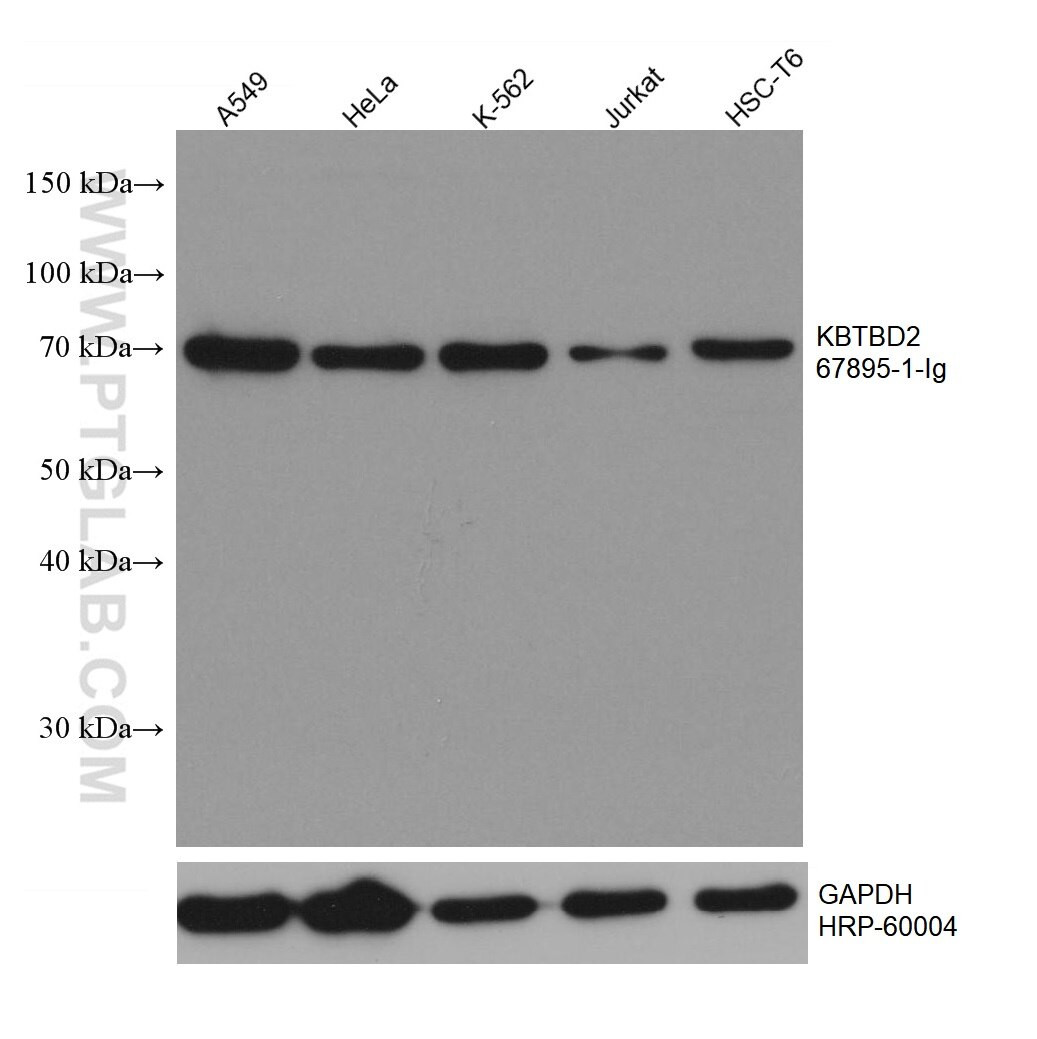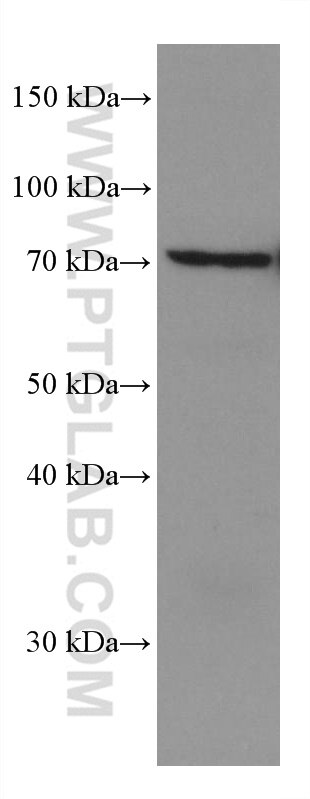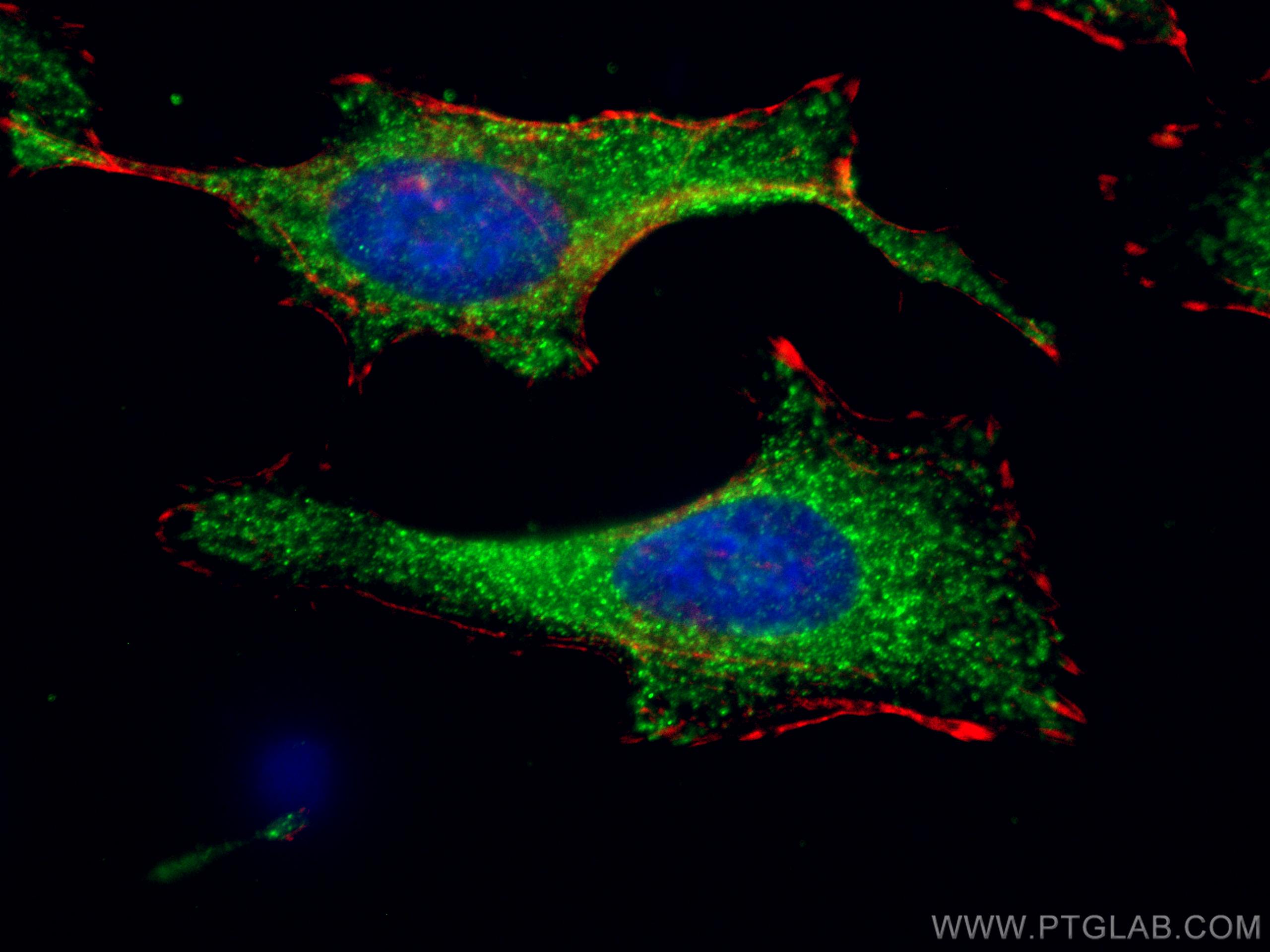KBTBD2 Monoklonaler Antikörper
KBTBD2 Monoklonal Antikörper für IF, WB, ELISA
Wirt / Isotyp
Maus / IgG1
Getestete Reaktivität
human, Maus, Ratte
Anwendung
WB, IF, ELISA
Konjugation
Unkonjugiert
CloneNo.
2A9F3
Kat-Nr. : 67895-1-Ig
Synonyme
Galerie der Validierungsdaten
Geprüfte Anwendungen
| Erfolgreiche Detektion in WB | A549-Zellen, HeLa-Zellen, Jurkat-Zellen, K-562-Zellen, U2OS-Zellen |
| Erfolgreiche Detektion in IF | HeLa-Zellen |
Empfohlene Verdünnung
| Anwendung | Verdünnung |
|---|---|
| Western Blot (WB) | WB : 1:1000-1:6000 |
| Immunfluoreszenz (IF) | IF : 1:200-1:800 |
| It is recommended that this reagent should be titrated in each testing system to obtain optimal results. | |
| Sample-dependent, check data in validation data gallery | |
Produktinformation
67895-1-Ig bindet in WB, IF, ELISA KBTBD2 und zeigt Reaktivität mit human, Maus, Ratten
| Getestete Reaktivität | human, Maus, Ratte |
| Wirt / Isotyp | Maus / IgG1 |
| Klonalität | Monoklonal |
| Typ | Antikörper |
| Immunogen | KBTBD2 fusion protein Ag4933 |
| Vollständiger Name | kelch repeat and BTB (POZ) domain containing 2 |
| Berechnetes Molekulargewicht | 622 aa, 71 kDa |
| Beobachtetes Molekulargewicht | 60-70 kDa |
| GenBank-Zugangsnummer | BC047107 |
| Gene symbol | KBTBD2 |
| Gene ID (NCBI) | 25948 |
| Konjugation | Unkonjugiert |
| Form | Liquid |
| Reinigungsmethode | Protein-G-Reinigung |
| Lagerungspuffer | PBS mit 0.02% Natriumazid und 50% Glycerin pH 7.3. |
| Lagerungsbedingungen | Bei -20°C lagern. Nach dem Versand ein Jahr lang stabil Aliquotieren ist bei -20oC Lagerung nicht notwendig. 20ul Größen enthalten 0,1% BSA. |
Hintergrundinformationen
Kelch repeat and BTB domain containing 2(KBTBD2), also known as BTB and kelch domain-containing protein 1, encodes a BTB-Kelch family subunit that p85α-specific recognition for the Cullin3-based E3 ubiqitin ligase complex, which regulates p85α protein ubiquitination and subsequently regulates phosphoinositide-3 kinases (PI3K) signaling (PMID:27708159). However, the expression profile and functional significance of Kbtbd2 is still largely unknown. The Human Protein Atlas which is an online source shows high Kbtbd2 expression in the spleen and thymus, suggesting that Kbtbd2 might involved in immunization (PMID:29331106). In addition, Kbtbd2 is related to Src-induced phosphorylation of protein, spermatogonial stem cell activity(PMID:15623525, 29331106).
Protokolle
| Produktspezifische Protokolle | |
|---|---|
| WB protocol for KBTBD2 antibody 67895-1-Ig | Protokoll herunterladen |
| IF protocol for KBTBD2 antibody 67895-1-Ig | Protokoll herunterladen |
| Standard-Protokolle | |
|---|---|
| Klicken Sie hier, um unsere Standardprotokolle anzuzeigen |




